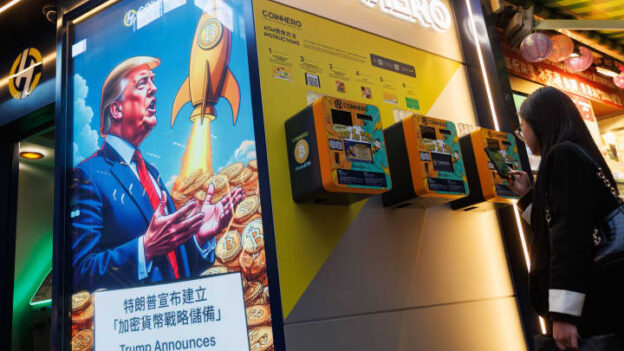- President Trump’s appointments at top financial regulators mark a sharp policy reversal for the crypto industry.
- Coinbase executives say the administration has been methodical and bipartisan in its push to integrate crypto into the $100 trillion capital markets.
- The Federal Reserve remains the last major regulatory holdout, with key restrictions on crypto banking still in place.
As President Donald Trump hit the 100-day mark this week for his second term in office, his approval numbers were lower than for any administration at this point in over seven decades.
Don’t tell that to the crypto community.
Trump ran for office on a promise to make America “the crypto capital of the world.” Those who got behind that message say he’s already delivered, or at least gotten off to a hot start.
A blitz of executive actions, strategic appointments, and early wins, from the creation of a Strategic Bitcoin Reserve to the rollback of enforcement-heavy SEC tactics, has left the industry feeling more welcome in Washington, D.C., than ever.
“Every single appointment — I’m happy with from a crypto perspective,” said Nic Carter, founding partner at Castle Island Ventures. “The previous financial regulatory apparatus was dead set against crypto, and now it’s been a total 180 compared to that.”
President Trump faced early blowback after proposing the possibility of a strategic crypto reserve that would go beyond bitcoin and include other digital currencies like ether, XRP, Solana’s SOL token and Cardano’s ADA. Skeptics said taxpayer dollars shouldn’t be spent on such risky assets. The president soon narrowed the plan to focus solely on bitcoin and made clear he wouldn’t use taxpayer funds to support a government buying strategy.
He’s also been criticized by some for launching a meme coin that’s added billions of dollars in paper wealth to his net worth. The $TRUMP token surged earlier this month after its website announced that top holders would be invited to a private dinner with the president. His family is also involved in other crypto projects.

“It doesn’t really help to have members of his family do encrypted projects of their own,” Carter said. “I understand that they are interested in the industry and want to engage with it, but the optics are not that favorable around that.”
But for the most part, that behavior is being ignored as the crypto industry prefers to focus its attention elsewhere even as the president’s job approval broadly sits at just 43%, according to an average of recent national polls.
At the Office of the Comptroller of the Currency, Jonathan Gould has signaled support for issuing new bank charters to crypto firms. During President Joe Biden’s presidency, that was almost unthinkable.
“We’ll see a lot of new crypto firms getting bank charters,” Carter said. “And new banks getting set up that are expressively focused on crypto and stablecoins.”
The Federal Deposit Insurance Corporation, under interim chair Travis Hill, is also making moves. Crypto fans have applauded his efforts to expose what industry insiders call “Choke Point 2.0,” an alleged coordinated effort by regulators during the Biden presidency to pressure banks into severing ties with crypto.
Paul Atkins, the new chair of the SEC, represents a stark contrast to predecessor Gary Gensler, who was a notorious hardliner when it came to crypto regulations and enforcement. Carter said the SEC under Atkins has already begun working directly with crypto stakeholders, including Castle Island, to craft guidance on token issuance and the line between securities and commodities.
“This is the clarity we’ve been asking for,” Carter said. “Even barring a legislative solution, I think the SEC is going to come out with real guidance around tokens and how a domestic crypto firm can operate.”
Atkins made his first public appearance just four days into the job by opening a crypto roundtable — a move that sent a clear signal to industry participants. Last week, Atkins hosted a half-day session at SEC headquarters in Washington, D.C., focused on crypto innovation and custody. The event took place weeks after the regulator formally dropped its long-running lawsuit against Ripple, a symbolic end to a four-year battle between the SEC and the crypto industry.
https://www.cnbc.com/amp/2025/05/01/trump-rewrites-crypto-rules-first-100-days-industry-sees-180-pivot-.html





